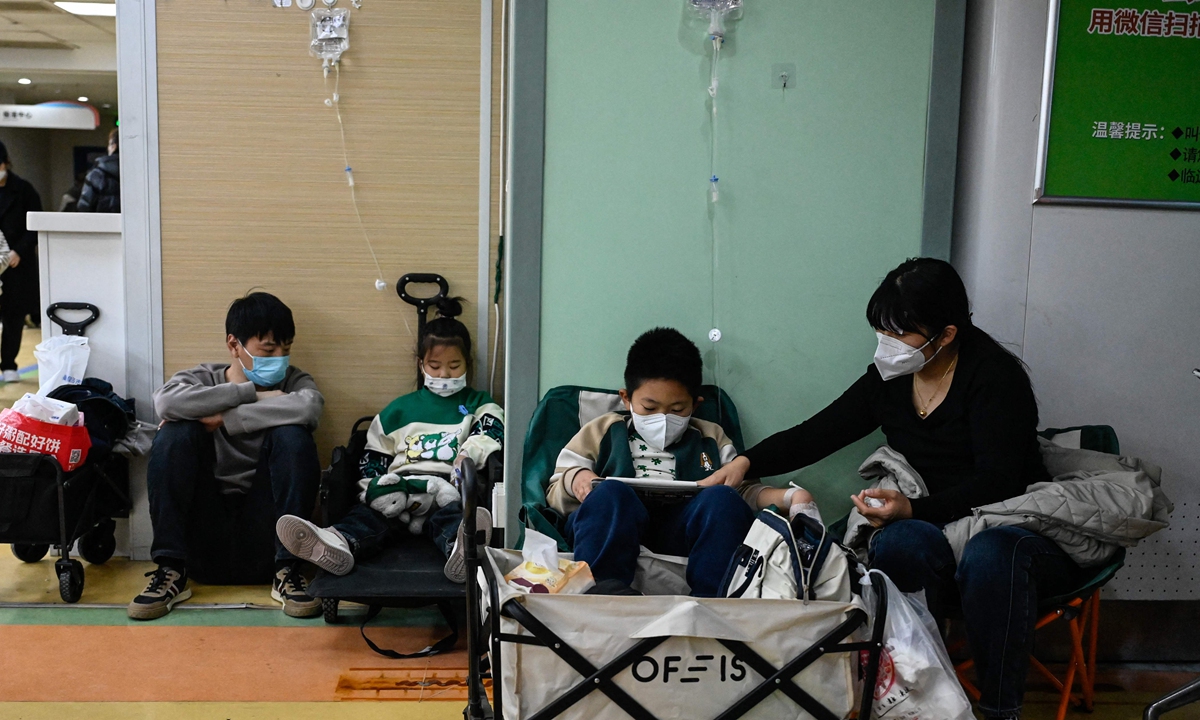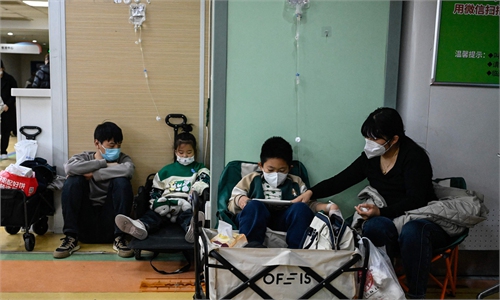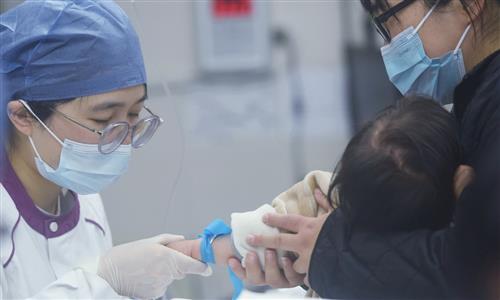'Pathological hatred' leads US senators to stigmatize respiratory disease outbreaks in China, not likely to impact Washington's decision making

Sick children receive a drip at a children's hospital in Beijing on November 23, 2023. Photo: VCG.
The pathological hatred toward China held by certain US lawmakers has led them to stigmatize seasonal respiratory disease outbreaks in China, said experts on Sunday after five US senators wrote to US President Joe Biden, urging him to ban travel between China and the US. This partisan-driven nonsense will not have a significant impact on government decision-making, experts said.
On Friday, five Republican senators led by Marco Rubio asked the Biden administration to restrict travel between China and the US, saying in a letter that "A mysterious respiratory illness is once again spreading in China. Until we know more about what could be a new pathogen, the US must do everything possible to prevent the illness from reaching our shores."
The senators also hailed former US president Donald Trump's decision to restrict travel from China in early 2020 due to the COVID-19 pandemic.
"The relevant claims are purely ill-intentioned fabrications. China firmly opposes them," said Liu Pengyu, the spokesperson for the Chinese Embassy in the US, in response to the letter, as reported by Reuters.
"Their ideas do not represent the Senate, but only reflect the views of a few extreme senators," Lü Xiang, a research fellow at the Chinese Academy of Social Sciences, told the Global Times on Sunday, pointing out that notorious anti-China senators like Rubio have always been trying to speak ill of China at every opportunity, and "searching for new excuses to attack China."
"This is a pathological hatred," Lü said. "Especially considering that information about the prevalence of respiratory diseases in China is fully transparent, and China maintains close communication with the WHO. In this situation, the statements made by these lawmakers are both foolish and shameless."
China has been in close communication with the World Health Organization regarding the prevalence of respiratory diseases. On Friday, the Chinese health authorities and the WHO held another teleconference regarding ongoing respiratory diseases. During the conference, Chinese experts provided an update on national monitoring and clinical diagnosis since the previous teleconference on November 23, led by China's National Health Commission (NHC).
During the online meeting, in-depth technical exchanges took place between both parties, focusing on multiple pathogen monitoring and mycoplasma pneumoniae infection. Both sides expressed their intention to continue communication on these matters.
"These (US) politicians engaging in negative hype regarding this sensitive topic involving China also have partisan intentions," Li Haidong, a professor at the China Foreign Affairs University, told the Global Times on Sunday.
"These hype tactics clearly have domestic political considerations," he said. "If this topic continues to ferment in the arena of US domestic public opinion, it will have a significant impact on the Democratic Party's electoral prospects. This is the intention of these Republican lawmakers."
After these politicians' remarks are amplified by the media, they will to some extent distort the public's perception of China, which will greatly harm grassroots China-US relations, warned Lü. However, he pointed out that in the current overall framework of China-US relations, such nonsensical talk is not likely to greatly influence the US government's decisions.
The acute respiratory diseases that are currently prevalent in China are all caused by known pathogens, and no new infectious diseases caused by new viruses or bacteria have been detected, the NHC said during a press conference held on Saturday. Officials stated that there are mature treatment methods available for the currently prevalent diseases.
As for China, it will take seriously the development of any potential epidemic, said Lü. "Currently, everything is normal in our daily lives, and the cooperation between the Chinese government and WHO is close. Facts will overcome the misleading statements spread by these lawmakers."



